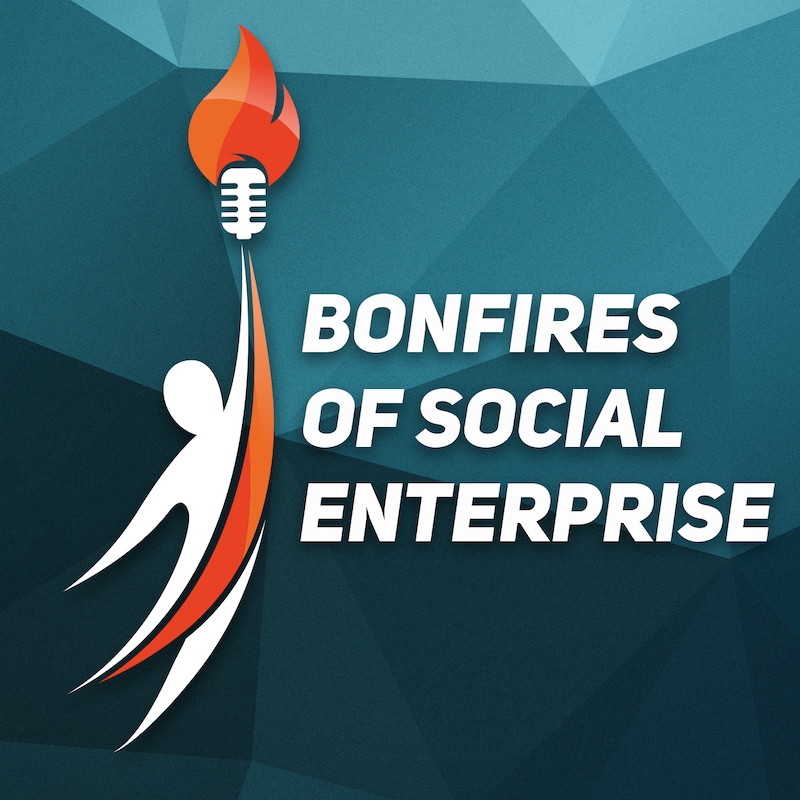
Shownotes
Stephen of Charity Charge
| Welcome back to another episode of The Bonfires of Social Enterprise. My name is Romy and I’m your host and guide here. This time, we hear from Stephen Garten, the founder and CEO of Charity Charge in Austin Texas. Stephen discusses the moment the idea came together along with the current and I guess, ongoing issues of a social enterprise today. As we do over here, there’s a great song at the end of this episode, so stay tuned all the way to the end.
|
For the full transcript – click below
Welcome back to another episode of The Bonfires of Social Enterprise. My name is Romy and I'm your host and guide here. This time, we hear from Stephen Garten, the founder and CEO of Charity Charge in Austin Texas. Stephen discusses the moment the idea came together along with the current and I guess, ongoing issues of a social enterprise today.
As we do over here, there's a great song at the end of this episode, so stay tuned all the way to the end. Now, Natalie Hazen has our Fun Fuel today, let's see what she came up with.
I’m Natalie Hazen and I am bringing you the Fun Fuel for this weeks episode.
Today’s college students are inundated with fliers & applications promoting the latest and greatest credit card. Of course, we can go back to the 1800’s when American merchants extended store credit to trusted customers. I think of all the old style cowboy movies where the weary cowboy dismounts his horse, ties the reins around a wood fence in front of the old general store and goes in to buy some well-needed merchandise like sasparilla or something. Gotta love the movies for that visual.
The WalletHub.com published an article about the history of the credit card and it was in the early 1900’s that a handful of US department stores and oil companies began issuing their own credit cards to be used at that particular business. Then came the Diners Club card and American Express charge cards in 1951 & 1959 respectively. Finally, in 1966, Bank of America launched the first general-purpose credit card: the Bank Americard – the forerunner to what is now VISA.
Now I’m certain, that there are still cowboys that dismount their horses and head into their local general store like in days of old, but the stores have certainly changed and so have the credit cards.
Thanks for listening to today’s Fun Fuel! Now on to the episode.
Oh my goodness, I have never connected [Sasparillo 00:00:46] with credit cards. Excellent Fun Fuel, Natalie you're the best. Oh my, let's drop in now to my conversation with Stephen Garten of Charity Charge.
Romy:
Okay, well welcome Stephen. You're calling in from Texas. I appreciate that.
Stephen Garten:
Happy to be here. Thanks for having me.
Romy:
Yes, we're excited to learn about Charity Charge. Let's jump right in. What is Charity Charge?
Stephen Garten:
Charity Charge is a credit card that lets cardholders earn cash back, that automatically gets donated to any nonprofit of their choice. It's in partnership with MasterCard, so the credit card's accepted around the world, wherever MasterCard is. I think an easy way for people to think about it for context is imagine say a Southwest Airlines credit card where every time you use that credit card, you are earning airline miles. Charity Charge is similar in nature to that, it's just that every time you use it, you earn one percent cash back that's tax deductible and automatically goes to any nonprofit of your choice.
Romy:
Wow. It sounds simple, but I'm sure that was not a simple thing to get set up with a big entity like MasterCard. How did you even attempt that, once you had the idea?
Stephen Garten:
Sure. I mean I'm trying to ... I'll answer it in two ways 'cause it's a big question, but hopefully in way that also resonates with other entrepreneurs, or people listening to the show thinking of their own ideas. I had been accumulating all these credit card reward points and come the end of the year; I went onto the bank's website to redeem 'em. I probably spent 45 minutes or so, scrolling through, hey, do I want this Olive Garden gift card for 25,000 points, or maybe I should get this Samsonite briefcase or this pair of binoculars. I was just agonizing over what to do with all my reward points. I remember that after a while, I guess that 45 minutes or so, and then just in frustration, I just logged off and thought, I don't need more stuff.
The next thing I did is I checked my email and a local nonprofit, actually in Austin where I live and the company's headquartered now, sent me an email. It was the end of your fundraising drive, and that's when it clicked. I thought I was accumulating all this value in credit card reward points, and I don't want them. I'd much rather support this nonprofit that I already loved and cared about. That gave me the gist of the idea, but I think the point that I'm making, maybe for some people listening, is that it just seemed like such a big idea and I had no clue how credit cards worked or anything about the industry. I didn't know anyone in the industry.
One of the really practical things I just started doing, is I leveraged Google and LinkedIn. I think the really cool thing about entrepreneurship in 2017 is that we're all connected and have access to experts. In any business that someone wants to start, there's always people who have come before 'em. A quote that I've always loved is that "Everything great is accomplished by standing on the shoulders of other giants." I just started reaching out, and cold-calling and cold-emailing credit card consultants and that started me on the path. I'm happy to go into the minutiae of how specifically I did it for Charity Charge, but it was definitely initially being willing to reach out to experts in the industry.
The funny thing, I think we're gonna be putting up a blog post on our site and a blog. I'm starting to detail this, but one of the things that happened though when I reached out to one of the top payment consultants in the New York City area is that they said, "Hey, we really like your idea. We think we can help you out." They said, "We're just gonna send over a proposal." I got a proposal for ... They wanted me to pay them $250,000 just to get started for them to take me through the steps to pitch banks and put together the model that I needed to use and negotiate the partnership and all that stuff. There were a lot of challenges along the way in trying to figure this thing out. Of course, I didn't have $250,000, so I really just had to figure it out on my own.
Romy:
Yeah. That's a good word for everybody. That often happens to us, as well. You've got somebody in there; my sister affectionately calls them "sharks in the tank." A lot of people stop there, don't they?
Stephen Garten:
... I think a big thing that entrepreneurial endeavors teach you is a level of just emotional intelligence and also just taking reality for what it is. It could have been easy for me just to have complained and said, well, these are consultants, these are sharks, they just want to charge me. The reality is that was their business, and their clients are the Southwest Airlines of the world that set the market rates, being willing to pay those enormous fees and things of that sort.
I think, at the time, I was completely dejected. I thought that there'd be no way to figure this whole thing out, but very much on the flip side of what you said there, the DIY is that what I learned is you can get out there. You can connect with people that started this conversation and get advice and all that, but at the end of the day, it does fall on you as an entrepreneur to actually go forward and execute.
It's been awhile since I thought about this experience, but on even this specific topic of connecting with experts in industry, I remember though that I called 17 people originally. They were credit card consultants that I found on LinkedIn or Google, and I got to number 18. The first 17 either didn't return my phone calls or if I got 'em on the phone, within 30 seconds, they rushed me off the phone, and they weren't interested in talking to me. Number 18 ended up being this gentleman, his first name's Hunter. He was working for a top consultant, one that I spoke with that didn't charge me. He was super friendly and great, gave me some basic advice on a handful of calls, a handful of emails. Then, fast forward about a year later or so, he was actually hired by MasterCard to run their co-brand business development team. Having that relationship early on, the guy that I cold-called, that I developed a relationship and he had respect for me and the idea that I was working on, was really instrumental in ultimately getting that partnership with MasterCard.
Yes, which is awesome for me now, and it's funny as I think back to just being in my apartment with this idea and trying to figure it out a handful of year ago.
Romy:
It's just helpful to go back to those humble beginnings and draw people's attention to, yeah, we all have to walk through some of these awkward early steps, right?
Stephen:
Yeah, absolutely. I agree with everything you just said. I think that a quote that had really resonated with me at the time ... I think I was watching a Tony Robbins video on YouTube or something. He said something to the effect of, "You know, most people quit 'cause they say they tried everything, but you've tried everything that doesn't work." [inaudible 00:10:39].
My uncle said to me once, he was relating to kind of ... When I was originally moved to Austin, I was looking for a job, and I was having trouble finding any place that would hire me and kept going on interviews and not getting hired and stuff. And he said, "It's just a game. You pull a lot of blanks out of the bag and eventually one of them is gonna be live. So you gotta take a lot of shots."
Romy:
That's good advice. Let's talk about what Charity Charge has become now.
Stephen:
I graduated college in 2008 and moved to Austin in 2010. But we officially launched the company in June of 2016, so it's been about 15 months, or 14 or 15 months now.
Romy:
Let's dive in. We're recording this in the end of summer, 2017, just about September. So what's happening right now with Charity Charge?
Stephen:
Yeah. We've got a couple of exciting new products and things around the corner that I'm gonna go into. But I would start with just saying that the first year was, to say the least, very overwhelming. When we launched, I was not quite expecting the reception. It was another thing that I've kind of proved the doubters wrong. I was the most surprised by anyone, I think. But when we launched, Today Show picked us up and Fast Company and Huffington Post and a lot of other national new outlets like that. So we were really overwhelmed with demand but also at the same time, as an entrepreneur when you're starting a new enterprise, you're trying to figure out and get your processes in place and your team in place and understand how you can scale your business model. So the past year was getting our feet underneath of ourselves and really figuring out ways that we can scale so that we can make impact.
I think that the really cool thing about Charity Charge, and kinda how I think about it, is it's really a tool for giving. I mean, we at Charity Charge have created this credit card that's really going into an industry that ... In total, 31% of consumers never ever redeem their reward points. So that's $16 billion a year that ultimately flows back to the credit card companies. They call that breakage. They really hide that from cardholders and consumers. But on the credit card industry's side of things, these big banks, they create and market these credit cards that, on the surface, seem to have really rich rewards and bonus points and all of that stuff but then they purposely create things like blackout dates or certain point thresholds you need to accrue towards in order to redeem it for that gift card or that level of cash back.
That billions of dollars flows back, so at Charity Charge, what we do is, the cardholders earn 1% but they pick their nonprofits up front, any nonprofit in the United States including K through 12 schools, churches, et cetera so that it automatically flows to the nonprofits. We have no breakage in our model. I'm kinda going on this rant because I think that we've just got such a great opportunity that we really wanted to figure out how we could scale it because we see this one day redirecting billions of dollars every year back to nonprofits, which goes along with our mission, which is more profits for nonprofits.
Romy:
Oh, I love it. I love it. Are you able to track how many dollars have been redeemed or sent out to the nonprofits sort of through the summer of 2017?
Stephen:
Yeah. I mean, we're fortunate that we're able to track all that. There's some things with our agreements with MasterCard and the bank right now that preclude us from sharing really intimate details about that. But we're working on figuring out some ways that we can be more transparent about our impact as the company.
Romy:
Yeah. Let's land on that for a minute. It is often that you might have some relationship issues or things that you can't disclose. How are you overcoming the impact statements? Everyone's interested in reported impact and the accountability of that. Are you able to report out any portion of that, or how are you addressing that with your key stakeholders that are attracted to you because of the potential dollar impact that you might be making?
Stephen:
Sure. One thing, just to be really clear. For the people that are actually cardholders, they're able to, at any point in time, log in to their donation dashboard and track and see what they've earned. From a cardholder's perspective, full transparency there. And then for our nonprofits that are benefiting from it, individually, we provide a report to them and let them know how much they've earned and things of that sort. But we wanna be more public and outspoken of our impact, so we're working through some things now. I would say this, I mean, it's probably not the politically correct answer. But I think in entrepreneurship, and it's something that I do every day at the company and will continue to do, is ... You gotta excuse me, Romy. I'm blanking on the [crosstalk 00:16:49]-
Romy:
That's all right.
Stephen:
What do they say? Ask questions later or [crosstalk 00:16:54]-
Romy:
Oh, yeah. And apologize later [inaudible 00:16:55] apologize.
Stephen:
Exactly, yeah. So, no. We'll be working to be more outwardly transparent, but for anyone, that's actually involved in the company ... If you're a cardholder, there's full transparency to the cardholders and then complete transparency to the nonprofits that are on the receiving end.
Romy:
Stephen, have you had any, I don't know, any pushback from the industry because of this breakage issue that you talked about? That's a lot of dollars sitting on the sidelines. I mean, you're a disruptor, right? We'll just call it that 'cause you're doing the right-
Stephen:
Well, I think-
Romy:
You're a doing the right thing disruptor, but sometimes people don't like it.
Stephen:
Yeah. I mean, I think that we're trying to be. I think disruption is such a big word. In companies that scale, like a Tesla or someone like that, have done it, we're trying to get there, right? We need more cardholders. We need more people that, whether it's ... just choosing to add Charity Charge to their wallet. They might wanna use their other cards for different times but even if it's 10% of the time, even if it's just to buy gas, or it's when you dine out with friends, add Charity Charge to your wallet so you can feel good and do good in those times that you wanna give back. That's kind of my message one or my little plug there, to be a little shameless.
But for us to actually get to that point where we're truly disrupting and sending billions of dollars back collectively to nonprofits in need ... Yeah. I think that we're a public benefit corporation, mission first, and that goes counter to the banks, right? I can't say that it's a bad thing. I think that the rules that they're playing in and the sandbox of how they're judged is just different than ours. If you're Bank of America or you're Chase,...





